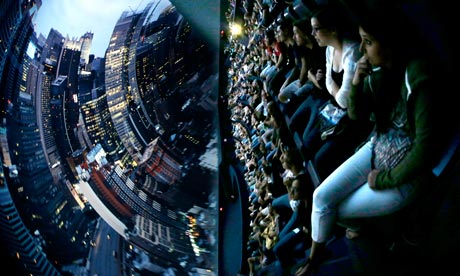This blog explores US influence (financial + cultural), Anglocentric (ie, primarily English) representations, digitisation, ownership, industry developments, audience, media theories, tracking key news + events, with Film/Media A-Level/undergrad students + educators in mind. Examples often include Sheffield's Warp (Indie) and London/LA-based Working Title (NBC-Universal subsidiary), ie This is England/Four Lions v Bridget Jones/Green Zone! Please acknowledge the source/blog author: Mr D Burrowes
Wednesday, July 25, 2012
Co-Ops + Indie Cinemas in UK
The iPad isn't great for blogging, so at another time I'll develop a links list on this - a topic you need to be able to say something on for your exam, and to be able to claim to truly understand the business of British Cinema and how it interacts with the audience. Whilst the warehouse style and scale multiplexes have now long dominated UK cinemas, there are 1500 Indie cinemas, with 500 supported by the BFFS ('the British Federation of Film Societies (BFFS) which represents more than 500 community cinemas and film societies across the UK').
This article seems to be advertorial (it's not made entirely clear, but looks like it to me), but is useful to get a broader understanding of the diversity of exhibition beyond the multiplexes ... and the role, once more, of digitisation in fostering this change and enabling Indie exhibitors (as digital projection is less skilled and cheaper, and crucially financially supported by a UK Film Council fund - at least until that body was scrapped by the coalition government, a questionable decision on economic or cultural grounds): https://socialenterprise.guardian.co.uk/en/articles/social-enterprise-network/2012/jul/24/co-operative-cinema-opportunity
Tuesday, July 24, 2012
IMAX: The Future or a Con?
As I'm sure many of you did I went to see TDKRises on the NMMs IMAX screen, and enjoyed the visceral experience that the screen size and sound quality offers.
3D has been widely pointed to as the saviour of a cinema business under threat from two results of digitisation: cheap digital home cinema and piracy. Whether the public will continue to pay huge premiums for the questionable benefit of 3D is debatable. We've seen 3D rise before as a fad, back in the 1950s.
IMAX nails one of the threats of digitisation though, offering a scale beyond he reach of home cinema.
Director Nolan insisted on shooting over 70mins of TDKRises in IMAX, an incredibly slow, thus expensive, production method, but several recent IMAX releases haven't been shot for IMAX, leading to a similar debate to that raging about digitally rendered 3D conversions of movies shot in 2D. There is even a LIEMAX campaign opposing inferior, potentially misleading IMAX screens.
Have a read through the article below, and some of the comments that follow, to get a grasp of this topic, a very useful case study to show your grasp of industry and consumption trends today. http://www.guardian.co.uk/film/filmblog/2012/jul/23/dark-knight-rises-imax
Director Nolan insisted on shooting over 70mins of TDKRises in IMAX, an incredibly slow, thus expensive, production method, but several recent IMAX releases haven't been shot for IMAX, leading to a similar debate to that raging about digitally rendered 3D conversions of movies shot in 2D. There is even a LIEMAX campaign opposing inferior, potentially misleading IMAX screens.
Have a read through the article below, and some of the comments that follow, to get a grasp of this topic, a very useful case study to show your grasp of industry and consumption trends today. http://www.guardian.co.uk/film/filmblog/2012/jul/23/dark-knight-rises-imax
The Dark Knight Rises, and takes Imax with himChristopher Nolan is singlehandedly transforming the prospects of the biggest picture show of all
Truly immersive? ... an Imax screening of The Dark Knight Rises. Photograph: Julio Cortez/AP
It may be that the awful events at the Century 16 multiplex in Aurora, Colorado, will forever cast a shadow over cinema-going. Yet The Dark Knight Rises could also point the way to a brighter future for an increasingly troubled industry. It could help reshape the way we watch movies.
The film includes 72 minutes of footage shot on the Imax system, the most ever for a studio narrative feature. For director Christopher Nolan, that meant working with cumbersome, jitter-sensitive and noisy cameras capable of only three-minute takes and requiring 20 minutes to reload. Still, he's in no doubt that the extra effort was worth it. He believes he has secured in return "the best quality image that has ever been invented".
In an Imax ("image maximum") camera or projector, 70mm film runs sideways, taking up 15 sprocket holes per frame instead of 35mm's four. The resulting picture is 10 times larger with 10 times the resolution. Ideally, it's displayed at up to twice the usual brightness, on a curved screen that can be as tall as an eight-storey building. Together with 360-degree surround sound and stadium seating, it's supposed to provide the "most immersive motion picture entertainment" available.
Sunday, July 08, 2012
How Audience became Movie-Makers
How cinema audiences have become movie-makers
The film industry used to have all the power over filmgoers. But home video and the internet have changed that relationship
http://www.guardian.co.uk/film/2012/jul/05/how-cinema-audiences-became-movie-makers
Subscribe to:
Posts (Atom)
